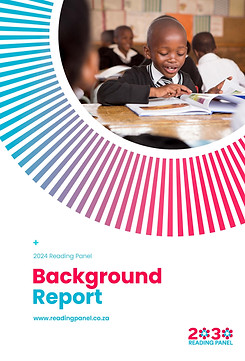
Resources


2025 Background Report
Author: Sipumelele Lucwaba
New SASE results show that 80% of Grade 3 learners are not reading at grade level, with the gap persisting into Grade 6 where almost 70% remain below grade-level. Strong home-language foundations remain critical, with Grade 3 proficiency linked to Grade 4 repetition and EFAL outcomes. Provinces such as the Western Cape, Eastern Cape, Free State and Gauteng are expanding early-grade assessments and interventions like Back-on-Track show early learning gains at scale. National progress continues to be constrained by budget pressures, teacher shortages and weak planning. The report also highlights severe teacher supply mismatches and notes that new national commitments, including a reading strategy, remain unfunded and unimplemented.
Advisory Notes

2024 Briefing Note - August
Author: Sipumelele Lucwaba
This note outlines the key challenges driving South Africa’s early grade reading crisis and the actions needed to address it. It highlights four system weaknesses: weak initial teacher education, insufficient learning and teaching materials, limited reliable assessment data in the foundation phase, and the absence of a budgeted national reading plan that scales proven interventions. The note identifies priority solutions, including a national long-term plan, a minimum LTSM package with graded readers and aligned teacher guides, strengthened teacher training, and annual Grade 2 reading assessments.

2024 Background Report
Author: Sipumelele Lucwaba
PIRLS 2021 shows that 81% of Grade 4 learners cannot read for meaning, with the share who “cannot read at all” doubling from 13% to 27% since 2016. Inequalities have deepened: learners in the poorest schools are now 10 times less likely to reach the low benchmark, and the gap between English and the lowest-performing African language has widened to almost three years. Despite fiscal constraints, provinces such as the Eastern Cape, Northern Cape, Gauteng and the Western Cape are rolling out evidence-based interventions including graded readers, coaching and structured materials.
Advisory Notes

2023 Background Report
Author: Nic Spaull
This report highlights a worsening literacy crisis, exacerbated by COVID-19, with an estimated 82% of Grade 4 learners unable to read for meaning. While recent research and small-scale interventions show promise, widespread improvement is hindered by inadequate funding, weak implementation, and lack of political urgency. The report stresses the need for early-grade reforms in teacher training, support, and curriculum. Without significant systemic change, the 2030 goal remains unlikely to be achieved.
Advisory Notes

2022 Background Report
Author: Nic Spaull
The 2022 Reading Panel Background Report reveals that 78% of Grade 4 learners in South Africa cannot read for meaning. It shows how slow progress and the impact of COVID-19 have set back years of educational gains. The report calls for urgent reform such as better teacher training, more resources, and regular assessments. With lessons from successful global examples, it lays out the steps needed to ensure all children read for meaning by 2030.























































